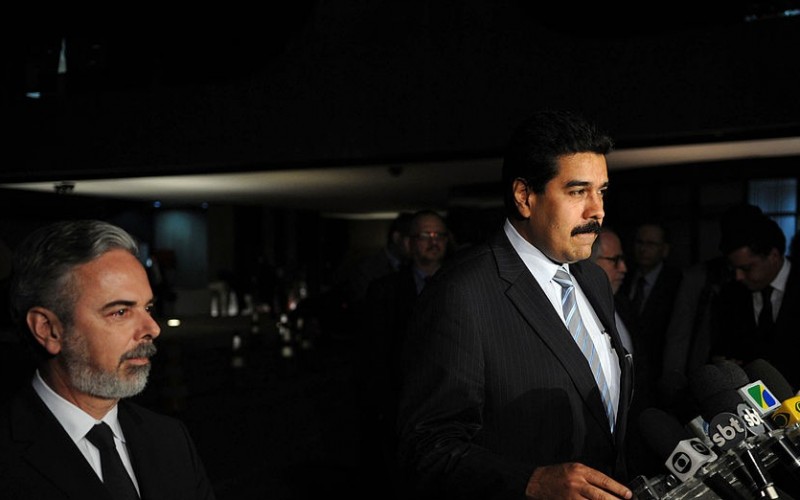Are tensions with Guyana Venezuela’s electoral wildcard?
by Martin De Angelis , August 9, 2015, Source
Venezuela’s government is facing an upsurge of riots and social turbulence due the deepening economic crisis. With elections coming ahead, President Maduro’s campaign is taking a sharp nationalist turn by means of antagonizing neighbouring Guyana over the disputed oil-rich region of Esequibo.
“In defense of the homeland” is President Nicolas Maduro’s renewed public speech, reframed in a manner to evoke patriotic emotions and divert the attention from the domestic emergency.
Venezuela is suffering an economic meltdown with chronic food shortages and nearly 120% inflation (this year alone) fuelling outbreaks of street violence.
Companies operating there are facing increased political risks. Following days of unrest and turmoil, with mobs looting supermarkets in search for living goods and food in several cities, the government has announced the expropriation of NestlÉ distribution warehouses and depots, the country’s biggest food company, as well PepsiCo, Cargill, and others.
Nationalism as an electoral wildcard
The Esequibo territory, reclaimed by Venezuela, encompasses two thirds of Guyana’s land, and the centennial dispute has reemerged following ExxonMobil’s announcement of important oil discoveries underneath the contested area.
Venezuela’s government has taken an ambiguous stance, playing the de jure and de facto cards simultaneously.
On the one hand, Mr. Maduro has requested Ban Ki Moon create a special commission to resolve the claim diplomatically. On the other hand, the President plans to issue 200,000 thousand Venezuelan ID cards to Guyanese citizens who inhabit the disputed territory.
Caracas has already redefined maritime borders and activated the so called ‘Atlantic ZODIMAIN’ (for Insular and Maritime Defense Zones), virtually making Guyana lose its sovereign access to the sea, leaving its coastal waters encircled by Venezuela’s and Suriname’s territorial waters.
The territory has been under legal scrutiny since 1966, thus its economic exploitation is not exclusive to any of the nations. However, Guyana has invested in energy exploration in the area over the last decade thanks to the good relations that Georgetown, Guyana’s capital, enjoyed with the now deceased Venezuelan President Hugo Chavez.
Now, things seem to have drastically changed. Mr. Maduro is facing a different world than the one his predecessor lived in, a world in which oil went from 120 to 50 USD a barrel over a relatively short period, crippling Venezuela’s economy.
Mr. Maduro does not have the charisma nor the popularity of Mr. Chavez, and currently faces the most ardent resistance Bolivarian Socialism has ever encountered.
December Parliamentary elections look grim, posing a serious threat to his administration. Ahead of a likely electoral failure, Mr. Maduro could gamble his odds by playing the classic hand of nationalist wildcards, in a desperate attempt to re-establish some popularity.
While the deep ideological rift within Venezuela’s society, which has lead to several political arrests of opposition leaders and outbursts of street violence, a vast majority of citizens express support for the Guyana affair.
For Venezuelans, Guyana’s Esequibo must be reclaimed, and it seems to be the very single thing that could unify the nation behind a shared objective.
Despite having opposition lawmakers and candidates under political imprisonment, congressional adversaries have rallied behind President Maduro’s claims to Esequibo, with the National Assembly voting unanimously in favour of Mr. Maduro’s measures with regards to Guyana. Some even proposed the creation of an Esequibo state once annexed to Venezuela.
Nearly every society has a historically sensitive question, which triggers deep nationalist fervour all along the board. Recalling feelings of patriotism is an old strategy used to override even the most entrenched social antagonisms.
Mr. Maduro might flirt with the possibility of an armed conflict for as long as his popularity ratings stay below the required level to secure an electoral victory.
(Usefully) escalating rhetoric
In Georgetown, Carl Greenidge, Vice President and Minister of Foreign Affairs has announced that President David Granger is not willing to have a face to face meeting with President Maduro, after rejecting the request for office mediation by the UN and requesting a resolution directly at the International Court of Justice at the Hague.
On July 24th in Washington, President Granger affirmed at the National Defense University of the U.S. Ministry of Defense, that “Guyana is facing a challenge to its survival by a larger state.”
“Who took him to Washington? Exxon Mobil,” said Mr. Maduro in reaction to Garner’s visit to the National Defense University, emblem of the past Hemispheric Defense scheme, a US Government containment tool used during the Cold War era.
Mr. Maduro visited the U.S. and met Ban Ki Moon, with pledges to “immediately activate a commission” to visit both neighbouring countries to defuse the tensions. At the same time, he has accused Guyana of “legitimizing imperialist pretensions against peace the region.”
So far, the rising tensions have only helped Venezuela’s government divert the attention away from its deepening socio-economic catastrophe, granting some oxygen support to the drowning government narrative. Meanwhile, the Venezuela’s actions have been deterring investments in Guyana and cast doubts about the future stability of the Caribbean region.

